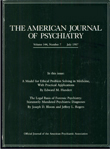Research Design in Clinical Psychology, 3rd ed.
A well-known clinical researcher and author of several works on the topics of research design, clinical psychology, child and adolescent therapy, psychotherapy, and cognitive behavior therapy, Alan Kazdin is Professor and Chairman, Department of Psychology, and Professor, Child Study Center, Yale University. This book is the third edition of a work originally published in 1980 and 1992. The third edition includes significant additions, revisions, and updates from the earlier editions.
This informative, interesting, and well-organized book describes and explains methodology and research design in clinical psychology. Its contents are also certainly relevant to research in disciplines such as psychiatry, counseling, education, school psychology, and social work.
The book covers methodological practices and procedures employed by clinical psychologists as well as the underpinnings, rationale, and purposes of these practices. It addressees in detail experimental design, assessment, sources of artifact and bias, data evaluation and interpretation, and ethical and professional issues raised by research. The 18 chapters of the book take the reader step-by-step in a problem-solving approach through the process of planning and executing clinical research. The book begins by defining and describing the various types of validity and continues by discussing the selection of research problems and designs and the publication and communication of research findings. It covers topics such as drawing valid inferences, control and comparison groups, observational research, the single-case research design, and statistical methods of data evaluation. It offers neat summaries and lists of further readings at the end of each chapter.
One of the strengths of this book is the meticulous and unsparing critical discussion of the relative merit and limitations of alternative approaches. Central to Kazdin's thesis is that “drawing valid inferences is not sacrificed when one leaves the methodological comforts of the laboratory. However, thoughtful and creative application of design strategies assumes greater importance to ensure that valid inferences can be identified.”
The book is an excellent one. Unlike many books dealing with research methods, this volume is written in an easy style that is a pleasure to read. Examples are interesting and constructive as models. Research Design in Clinical Psychology is highly recommended, particularly to graduate students, beginning investigators, and board candidates. One can read the entire book and become well informed about the complex topic of research design in psychology and psychiatry, or one can use the book as a useful reference to different research methods.



